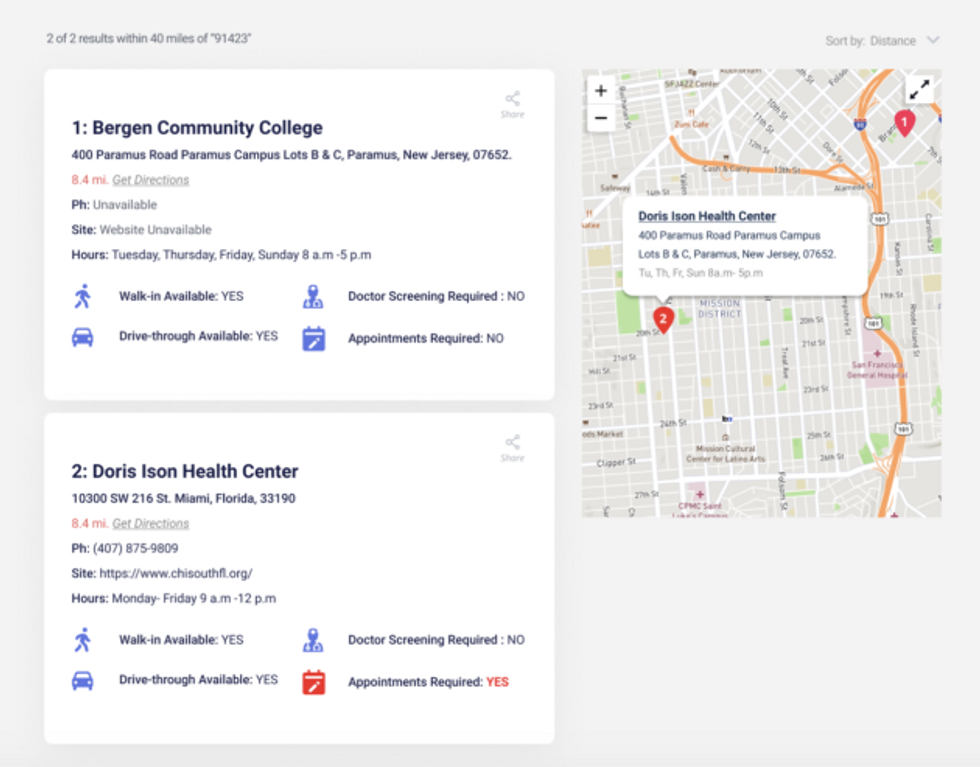Volunteers Launch Database for COVID-19 Test Centers Across the U.S.

When Tarryn Marcus set out to create a comprehensive database of COVID-19 testing centers across the United States, her call for volunteers to help build it drew more than 120 responses. Today, with 35 active volunteers including developers, data scientists, content writers, social media producers, and marketers, she is running Get Tested COVID-19 like a tech startup.
Marcus grew up in Washington, attended the University of Washington and worked for a few startups, including most recently at the AR/VR company Pixvana as director of demand generation.
She started the testing database in March with her partner, Zach Boldyga, who runs a healthcare software company called Scalabull, a network that provides connections between clinical labs and doctors across the U.S. He works directly with most of the clinical labs that are providing testing for COVID-19.

"Our backgrounds were a pretty good launchpad for the effort," Marcus said. "We were able to get some early insight from the healthcare industry, build the initial website, and start to spread the word quickly."
Get Tested COVID-19 is intended to work as a crowdsourced effort to streamline access to testing information, even as reports show that testing has remained inadequate to date.
"We didn't hesitate to see whether other organizations would create this resource. We knew it had the potential to be helpful, it was within our wheelhouse, and we could get it up and running quickly, so we dove in," Marcus said.
The database now includes more than 2,100 testing centers, and users enter their zip code to find the nearest site, including hours and requirements. There is also a comprehensive guide to when and why people should get tested.
Right now, the site primarily tracks active case testing with the nasal swab, which is the primary testing method of the drive-thrus. Some walk-ins are blood testing and a small handful (10) are doing antibody, according to Marcus, who said they are working on a design to distinguish between test types.

Elsewhere when it comes to resources, Google is now showing information for testing centers on searches for terms related to COVID-19, The Verge reported. And Apple Maps intends to add that information as well, according to Business Insider.
Operating more smoothly like a company now, Get Tested COVID-19 has projects in motion for data science, UX improvements, marketing, software engineering, and communicating with stakeholders in the industry to explore additional ways to add value.
Some of volunteers work full time for larger tech companies, some are freelancers, and others have been recently laid off and are choosing to spend their time on COVID-19-related projects. Organizations like Fullstack Academy have reached out and offered the help of recent graduates.
"Everyone just seems to really want to help in whatever way they can," Marcus said, adding that some contributors are working full time on the effort, and that the time she's put in has been much more than initially anticipated.
The team has identified lots of issues and opportunities, and we're all rallying around putting a high-quality tool in front of anyone who needs it.
With volunteers from six different time zones across the world, establishing clear project workflows and tools for communication has proven critical. There's even a mission statement and guidelines.
Core tools driving the project from an organization standpoint are GitHub for development and Slack, Google Hangouts, and Zoom for communication. Web scrapers, machine learning and human-validated data are all employed. A small team is crunching data in Python to provide helpful insights to responders in the healthcare industry. And Get Tested is leveraging free Amazon Web Services credits to run the website and ensure it is ready to scale.
"The team has identified lots of issues and opportunities, and we're all rallying around putting a high-quality tool in front of anyone who needs it," Marcus said. "The reality is that we are not first responders or essential workers, and outside of giving money and staying indoors, this is a direct way we can hopefully provide value and contribute to the fight against COVID-19."
"I know for sure that we can build something amazing" she added. "Our biggest challenge is ensuring that the average American knows that this resource exists."





 Image Source: Skyryse
Image Source: Skyryse